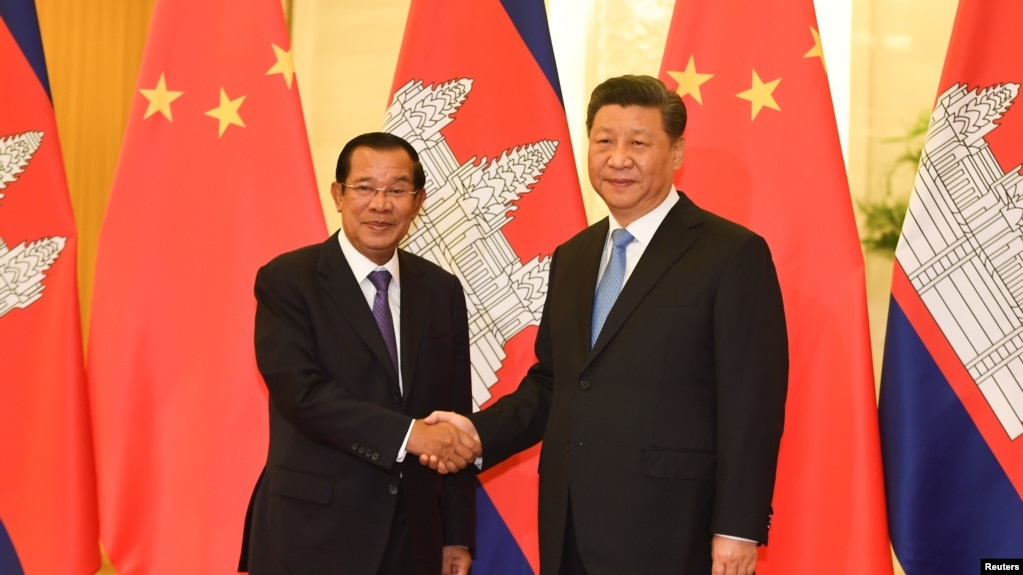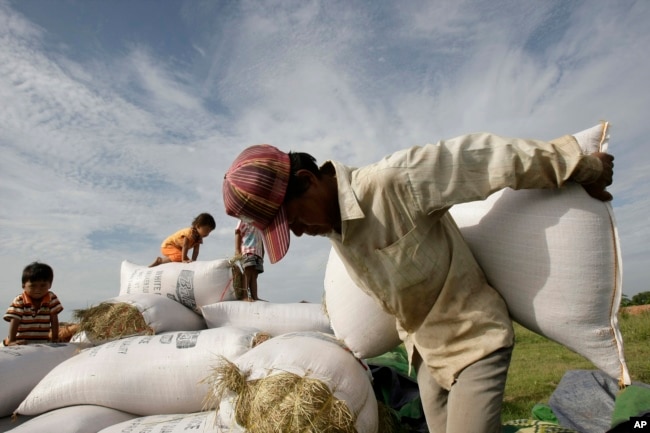Comment: នេះអាចសបញ្ជាក់ថាលោកហ៊ុនសែនមិនមានចេតនាកែប្រែស្ថានភាពរបត់នយោបាយខ្មែរទៅរកលទ្ធិប្រជាធិបតេយ្យសេរីពហុបក្សតាមការទាមទាររបស់សហគមអឺរ៉ុបទេ ហើយការកំណត់ទៅចិនដើម្បីចុះហត្ថលេខាពាណិជ្ជកម្មដែលមានផលតិចជាងEBAច្រើនណាស់របៀបនេះ ជាការផ្គើនទៅលើសហគមអន្តរជាតិនិងប្រជាជាតិខ្មែរទាំងមូលដែលស្រឡាញ់លទ្ធិប្រជាធិបតេយ្យនិងការបោះឆ្នោតដោយសេរីយុត្តិធម៍នោះ។ នេះជាយុទ្ធនាការបន្តអំណាចផ្តាច់ការ ផ្តាច់សង្ខារជីវិតខ្មែរ ជាជាងប្រយោជន៍ជាតិនិងប្រជាជន។ ជាការមើលឃើញ សហគមអឺរ៉ុបនឹងដក២០ភាគរយតាមកំហិត ប្រជាពលរដ្ឋជាពិសេសកម្មកររោងចក្ររាប់សែននាក់នឹងអត់ការងារធ្វើ។ ២០ភាគរាយអាចថាតិច តែវាធ្វើអោយកិត្យានុភាពនិងភាពទុកចិត្តនៃការវិនិយោគទុននៅកម្ពុជាពីសំណាក់អ្នកវិនិយោគទុនល្អៗនឹងបាត់បង់។
10 July 2020

PrintPHNOM PENH —
Prime Minister Hun Sen is scheduled to be in Beijing on August 12 to sign a free trade agreement with his Chinese counterpart. The new agreement is expected to usher in an enhanced level of economic cooperation between the two countries, deemed especially important to Cambodia.
Cambodia’s undeveloped economy has benefited from close ties with Europe since the United Nations Transitional Authority of Cambodia helped govern the country from 1991 to 1993 following years of war that had decimated the country.
The deal is another sign of the growing friendship between China and Cambodia. China has become the Kingdom’s largest investor and its’ geopolitical support to counter the West and, on occasion, ASEAN.
The negotiated Cambodia-China Free Trade Agreement (FTA) has been kept under wraps since talks began in December. Recently, officials have said it will hinge on agricultural trade and build on Cambodia’s existing trade with the Asian and global economic powerhouse.
Vongsey Vissoth, a permanent secretary of state at the Economy Ministry, confirmed on Wednesday in a press conference that Prime Minister Hun Sen would make the trip to Beijing to sign the agreement.
“Now we have FTA from China and [we] try the best,’’ Vongsey Vissoth said. ‘’FTA is just a market, but we need to have products to export.’’
On April 7, Hun Sen called on citizens to focus on growing and processing agricultural products to sustain the economy because, he noted, other economic drivers like tourism and manufacturing were faltering due to the COVID-19 pandemic.
“We will use this difficult time as an opportunity for Cambodia’s agricultural sector, which has slow growth,” Hun Sen said.
Vongsey Vissoth acknowledged that there would be challenges to overcome to fully utilize the FTA, noting requirements for exporting to China would be related to pricing and quality and sanitation of goods and products. The Chinese had indicated, he said, that fish exports had potential in the future.
However, multiple reports including some from the Mekong River Commission, show that fish numbers are fast dropping in Cambodian rivers on account of climate change and the increasing number of dams along the mainstream Mekong.
Cambodia has also struggled to consolidate its agricultural production in the past, largely because of the lack of infrastructures, such as warehousing, cold storage, processing plants, and generally high operating costs, including electricity.
Government figures show that bilateral trade in 2018 was around $7.4 billion, which was heavily skewed in China’s favor, accounting for more than 80 percent of trade. That year, Cambodia exported around $800 million, mostly in agricultural products, and imported large quantities of raw materials for the manufacturing and construction sectors.

Hean Vanhan, the secretary of state of Agriculture Ministry who took part in the FTA negotiations, said a number of products will be on a tariff-free list, which will be reviewed periodically. For now, he said, rice, bananas, and mangoes will be on the list.
“We opened the blockages and obstacles [to trade],” he said. “The government has tried [to get] the policy and then we depend on the private companies’ capacity.”
A critical aspect to the FTA will be whether it can offset losses from the partial suspension of trade benefits to Europe. There has been no public mention of whether China has agreed to import clothing produced in Cambodia. China, itself, is an exporter of clothing and raw materials used in the manufacturing process.
Hean Vanhan said the FTA would be able to limit damage from the suspension of EU privileges but did not elaborate on how.
“If we lose EBA, I think this agreement, we have has very large benefits and it is better,” Hean Vanhan said.
Ken Loo, secretary-general of the Garment Manufacturers Association in Cambodia, said the trade agreement will benefit Cambodia’s garment sector since Cambodia will be able to export to China without tariffs, even though exports to China were seven to eight percent, compared to the 45 percent already being exported to the European Union.
